One of the most significant events of the nation, Gandhi Jayanti marks the birthday of India’s most revered activist-lawyer Mohandas Karamchand Gandhi, who played a great role in ending the British colonial rule in India.
Also known as the ‘Father of the Nation’, Mahatma Gandhi or Bapu Ji was born on 2nd October 1869, which is observed as Gandhi Jayanti every year in India for commemorating his efforts and ideologies. The United Nation declared this day as the ‘International Day of Non-Violence’ on 15 June 2007 during a General Assembly.
Gandhi Jayanti History and Significance
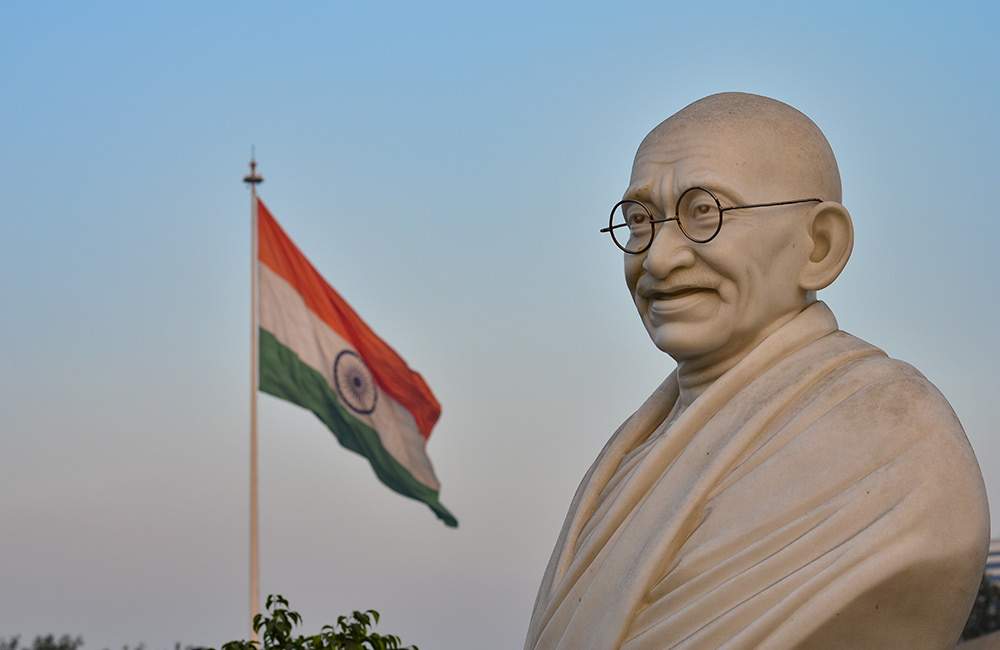
Gandhi Jayanti 2024 | History and Significance
Mohandas Karamchand Gandhi was born in Porbandar, Gujarat on 2nd October. Gandhi attended the Inner Temple in London for studying law. Soon after Bapu Ji completed his graduation from London, he went to South Africa for practicing law. After observing the miserable treatment which the Indian peasants were receiving in South Africa, Gandhi implemented nonviolent Civil Disobedience Movement against the African officials.
In 1915, Gandhi returned to India & observed that the British government has imposed an excessive tax on Indian workers and began protesting against it. In 1921, Mohandas became the leader of the Indian National Congress & thereon he led multiple campaigns for attaining ‘Swaraj’ (self-rule).
Throughout the protest against British rule in India, Gandhi’s major ideologies were Ahimsa and Satyavad (non-violence and truthfulness). In 1930, he led the 400-km long Dandi Salt March to end the salt tax. Later, he initiated the Quit India Movement for ending the British rule in 1942.
With his persistent efforts, Gandhi finally pushed the foreign rulers out of India. In the year 1947, the last viceroy of pre-independent India, Lord Mountbatten declared India as a sovereign nation and divided it into two independent countries: India and Pakistan. Since then, Gandhi’s birthday has been celebrated as a National Festival of India.
International Day of Non-Violence
The International Day of Non-Violence is observed on 2 October as Gandhi Jayanti each year to commemorate the birthday of Mahatma Gandhi, a prominent leader of the Indian independence movement against British colonial rule and a staunch advocate for non-violent civil disobedience. This day serves as a reminder of the power of non-violence in achieving social and political change and emphasizes the importance of peaceful resistance as a means to resolve conflicts and promote justice worldwide.
The International Day of Non-Violence was officially declared by the United Nations (UN) in honour of Mahatma Gandhi. The resolution to establish this day was passed on June 15, 2007, and the first International Day of Non-Violence was observed on October 2, 2007, to coincide with Gandhi’s birthday.
The celebration of the International Day of Non-Violence varies from country to country, but its significance is recognized and observed in several important ways around the world.
- India: As the birthplace of Mahatma Gandhi, India holds special significance for the International Day of Non-Violence. On this day, various events and activities take place, including prayer meetings, seminars, lectures, and cultural programs that promote Gandhi’s teachings of non-violence and peace.
- The United States: In the United States, many educational institutions, peace organizations, and community groups organize events and lectures to commemorate the day.
- South Africa: In South Africa, the International Day of Non-Violence is often connected to the legacy of Nelson Mandela, who was greatly influenced by Gandhi’s philosophy of non-violence.
- United Kingdom: The UK also observes this day with various activities, including seminars, workshops, and lectures on non-violence and conflict resolution.
- Other Countries: The International Day of Non-Violence is celebrated in many other countries as well. In general, events and activities tend to focus on promoting non-violence, peace education, and conflict resolution.
Gandhi Jayanti 2024: Whether it is a Holiday or Not?
Gandhi Jayanti is a national holiday in India celebrated on October 2nd each year to commemorate the birthday of Mahatma Gandhi, the father of the Indian nation. It is a public and bank holiday in India, and government offices, schools, and many businesses are typically closed on this day to honour his legacy and promote his ideals of non-violence, truth, and civil disobedience.
Life History of Mahatma Gandhi
Mohandas Karamchand Gandhi, commonly known as Mahatma Gandhi, was a prominent leader in the Indian independence movement against British colonial rule. He was born on October 2, 1869, in Porbandar, India, and grew up in a relatively affluent family. Gandhi studied law in London and later worked as a lawyer in South Africa, where he experienced racial discrimination and injustice firsthand. These experiences initiated his commitment to fighting for civil rights and justice.
Gandhi returned to India in 1915 and soon became a central figure in the Indian National Congress, which was advocating for India’s independence from British rule. He employed nonviolent civil disobedience and peaceful protests as his primary tools for social and political change, which he called “Satyagraha” or the force of truth.
Gandhi’s life was marked by numerous movements and campaigns, including the Non-Cooperation Movement, the Civil Disobedience Movement, and the Salt March. He emphasized the importance of self-reliance, simplicity, and nonviolence as key principles in achieving social and political reform.
Why is Gandhi Remembered Throughout the World
Mahatma Gandhi is remembered and revered for several reasons:
- Nonviolent Resistance: Gandhi’s philosophy of nonviolent resistance and civil disobedience inspired similar movements worldwide, including the American civil rights movement led by Martin Luther King Jr. His commitment to peaceful protest became a powerful tool for achieving social and political change.
- Advocacy for Human Rights: Gandhi was a tireless advocate for human rights, including racial equality, social justice, and religious tolerance. He fought against discrimination and oppression in various forms and championed the rights of marginalized communities.
- Simplicity and Self-Sufficiency: Gandhi’s personal life reflected his values of simplicity and self-sufficiency. His simple lifestyle and emphasis on minimalism resonated with many people and served as a model for sustainable living.
- Global Influence: Gandhi’s ideas continue to influence movements and leaders around the world. His principles of nonviolence, peaceful resistance, and social justice remain relevant in contemporary struggles for justice and equality.
Role of Mahatma Gandhi in the Freedom Movement
Mahatma Gandhi played a pivotal role in India’s struggle for freedom and independence from British colonial rule. His leadership and philosophy of nonviolence, also known as Satyagraha, had a profound impact on the Indian independence movement. Here’s a brief overview of his role:
- Nonviolent Resistance (Satyagraha): Gandhi’s most significant contribution was his advocacy and practice of nonviolence as a means to achieve political and social change. He believed that nonviolent resistance could be a powerful weapon against oppression and injustice. His famous Salt March in 1930, where he and his followers walked to the Arabian Sea to make salt in defiance of British salt laws, is a prime example of his nonviolent approach.
- Civil Disobedience: Gandhi encouraged acts of civil disobedience, such as boycotts, protests, and noncooperation with British authorities. These actions were aimed at disrupting British governance and economic control in India, leading to increased political pressure on the colonial administration.
- Mass Mobilization: Gandhi’s ability to mobilize the masses cannot be matched. He appealed to people of all backgrounds and regions, unifying the diverse Indian population under a common cause. His leadership brought millions of Indians into the freedom struggle, making it a mass movement.
- Negotiations with the British: Gandhi engaged in several rounds of negotiations with British officials to secure India’s independence. He represented the Indian National Congress in discussions with British authorities, seeking a peaceful resolution to the conflict.
- Quit India Movement: In 1942, Gandhi launched the Quit India Movement, a mass protest demanding an immediate end to British rule. Despite facing harsh repression by the British government, this movement marked a turning point in the struggle for independence.
- Role in the Constitution: Although Gandhi did not directly participate in drafting the Indian Constitution, his ideas on social justice, decentralization, and nonviolence had a significant influence on the framing of India’s democratic and inclusive constitution.
Who Else Shared a Birthday with Gandhiji
Mahatma Gandhi, born on October 2, 1869, shared his birthday with Lal Bahadur Shastri, who was also a prominent Indian leader. Lal Bahadur Shastri was born on October 2, 1904. He served as the second Prime Minister of India and is known for his role in leading India during the Indo-Pakistani War of 1965 and for advocating the famous slogan “Jai Jawan Jai Kisan” (Hail the Soldier, Hail the Farmer). They also came up with the slogan “Do or Die” which became popular during the freedom struggle against the British. Both Mahatma Gandhi and Lal Bahadur Shastri are celebrated figures in Indian history, and their birthdays are observed as public holidays in India.
Gandhi Jayanti Celebrations across India
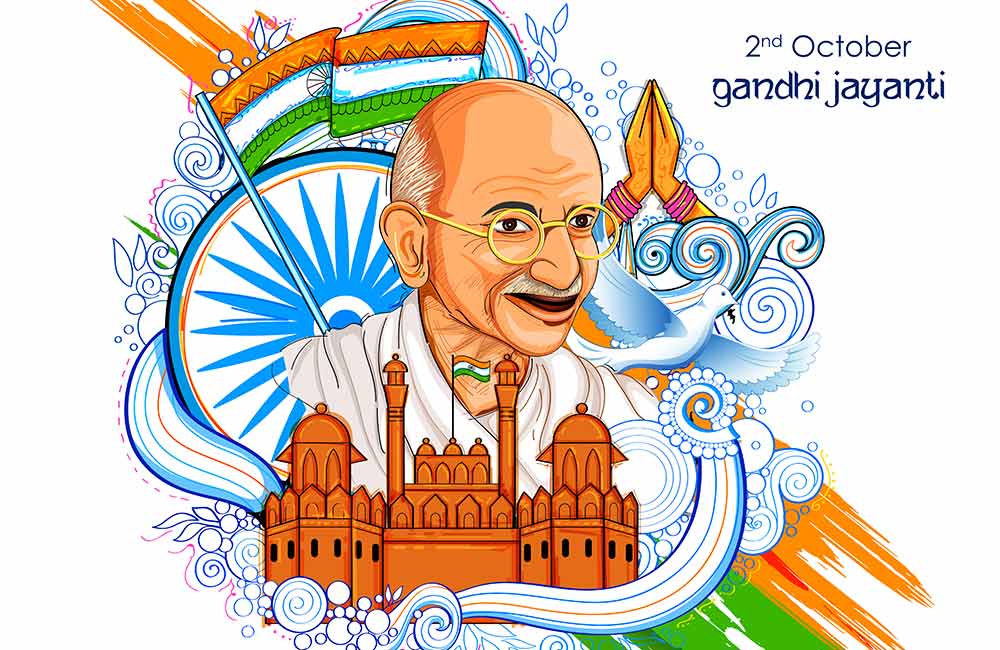
Gandhi Jayanti 2024 | Celebrations across India
Observed as a Gazetted holiday in India, Gandhi Jayanti is celebrated with great enthusiasm and multiple festivities. Educational institutes including schools, colleges and universities hold special assemblies for honouring the ideologies and paths shown by Mahatma Gandhi. Tri-coloured flags are hoisted at multiple locations all over the nation and patriotic functions are organized at prominent public places.
Gandhi’s favourite Bhajan, ‘Raghupati Raghav Raja Ram’ is played at prayer meetings in his memory. Idols of Mahatma Gandhi all over India, are decorated with flowers.
Best Places to Observe Gandhi Jayanti in India
Gandhi Jayanti is celebrated with utmost enthusiasm in the following places because of the historical importance related to them.
1. Sabarmati Ashram, Ahmedabad, Gujarat
Gandhi Jayanti is celebrated with great respect at Sabarmati Ashram in Ahmedabad, Gujarat. On this special day, visitors from all over the country and the world gather at the ashram to pay tribute to Mahatma Gandhi. The celebration typically begins with a morning prayer meeting, where devotional songs and Gandhi’s favourite bhajans are sung. The day also involves activities like spinning cotton on charkhas, which was one of Gandhi’s symbolic acts of self-reliance and economic empowerment. Additionally, visitors take a tour of the ashram to explore the historical artefacts and the place where Gandhi lived and worked for many years.
2. Aga Khan Palace, Pune, Maharashtra
The celebrations at Aga Khan Palace, Pune typically begin with a prayer meeting, where people sing devotional songs and recite Gandhi’s favourite hymns. To honour his legacy, volunteers often engage in activities such as cleaning the premises and planting trees, promoting Gandhi’s message of self-sufficiency and environmental consciousness. The Aga Khan Palace serves as a reminder of Gandhi’s captivity during India’s struggle for independence, and on this day, it becomes a hub of reflection and tribute to his enduring legacy of peace and freedom.
3. Mani Bhavan Gandhi Museum, Mumbai, Maharashtra
On this significant day, the Mani Bhavan Gandhi Museum pays homage to Mahatma Gandhi by organizing a series of events and activities. Special exhibitions showcasing rare artefacts, photographs, and documents related to Gandhi’s life are also set up, offering visitors a glimpse into his remarkable journey.
4. Gandhi Smriti, Raj Ghat, Delhi
Gandhi Jayanti, celebrated at Gandhi Smriti in Raj Ghat, Delhi, is a reflective occasion dedicated to honouring the life and teachings of Mahatma Gandhi. Visitors often garland the black marble memorial marking his cremation site with flowers, and dignitaries from across the nation come to offer floral tributes.
You May Also Like: Diwali 2024
Gandhi Jayanti 2024 Quotes and Wishes
Mahatma Gandhi, the leader of the Indian independence movement against British rule, was known for his profound wisdom and inspirational quotes. Here are some of his most famous quotes:
1. “You must be the change you want to see in the world.”
2. “The best way to find yourself is to lose yourself in the service of others.”
3. “An eye for an eye only ends up making the whole world blind.”
4. “The weak can never forgive. Forgiveness is the attribute of the strong.”
5. “In a gentle way, you can shake the world.”
6. “First, they ignore you, then they laugh at you, then they fight you, then you win.”
7. “You may never know what results come of your actions, but if you do nothing, there will be no results.”
8. “Freedom is not worth having if it does not include the freedom to make mistakes.”
9. “Happiness is when what you think, what you say, and what you do are in harmony.”
10. “The future depends on what you do today.”
These quotes reflect Gandhi’s philosophy of nonviolence, truth, and the power of individual and collective action for positive change. People wish each other a Happy Gandhi Jayanti on this occasion.
Year-Wise Mahatma Gandhi Jayanti Observances
| YEAR | DAY | DATE | Event/Festival |
| 2015 | Fri | 2-Oct | Gandhi Jayanti |
| 2016 | Sun | 2-Oct | Gandhi Jayanti |
| 2017 | Mon | 2-Oct | Gandhi Jayanti |
| 2018 | Tue | 2-Oct | Gandhi Jayanti |
| 2019 | Wed | 2-Oct | Gandhi Jayanti |
| 2020 | Fri | 2-Oct | Gandhi Jayanti |
| 2021 | Sat | 2-Oct | Gandhi Jayanti |
| 2022 | Sun | 2-Oct | Gandhi Jayanti |
| 2023 | Mon | 2-Oct | Gandhi Jayanti |
| 2024 | Wed | 2-Oct | Gandhi Jayanti |
| 2025 | Thur | 2-Oct | Gandhi Jayanti |
Other Festivals in India with Holiday Type
| Festivals in India | Day | Date | Holiday Type |
|---|---|---|---|
| New Year’s Day | Mon | 01-Jan | Restricted Holiday |
| Lohri | Sat | 13-Jan | Restricted Holiday |
| Makar Sankranti | Sun | 14-Jan | Restricted Holiday |
| Pongal | Mon | 15-Jan | Restricted Holiday |
| Guru Gobind Singh Jayanti | Wed | 17-Jan | Restricted Holiday |
| Republic Day | Fri | 26-Jan | Gazetted Holiday |
| Losar | Sat | 10-Feb | Restricted Holiday |
| Basant Panchmi | Wed | 14-Feb | Restricted Holiday |
| Guru Ravidas Jayanti | Sat | 24-Feb | Gazetted Holiday |
| Maharshi Dayanand Saraswati Jayanti | Wed | 6-Mar | Restricted Holiday |
| Mahashivratri | Fri | 8-Mar | Gazetted Holiday |
| Holi | Mon | 25-March | Gazetted Holiday |
| Good Friday | Fri | 29-Mar | Gazetted Holiday |
| Easter Day | Sun | 31-Mar | Restricted Holiday |
| Gudi Padwa | Tue | 9-Apr | Restricted Holiday |
| Eid-ul-Fitr | Wed | 10-Apr | Gazetted Holiday |
| Vaisakhi (Vishu) | Sat | 13-Apr | Restricted Holiday |
| Rama Navami | Wed | 17-Apr | Gazetted Holiday |
| Mahavir Jayanti | Sun | 21-Apr | Gazetted Holiday |
| Rabindra Jayanti | Wed | 8-May | Restricted Holiday |
| Buddha Purnima (Vesak) | Thu | 23-May | Gazetted Holiday |
| Id-ul-Zuha (Bakrid) | Mon | 17-Jun | Restricted Holiday |
| Rath Yatra | Sun | 7-Jul | Gazetted Holiday |
| Muharram (Ashura) | Wed | 17-Jul | Gazetted Holiday |
| Independence Day | Thu | 15-Aug | Gazetted Holiday |
| Parsi New Year’s Day (Nauraz) | Thu | 15-Aug | Public Holiday |
| Raksha Bandhan (Rakhi) | Mon | 19-Aug | Restricted Holiday |
| Janmashtami | Mon | 26-Aug | Restricted Holiday |
| Ganesh Chaturthi | Sat | 7-Sep | Restricted Holiday |
| Onam | Sun | 15-Sep | Restricted Holiday |
| Milad-un-Nabi or Id-e- Milad | Mon | 16-Sep | Gazetted Holiday |
| Gandhi Jayanti | Wed | 02-Oct | Gazetted Holiday |
| Dussehra | Sat | 12-Oct | Gazetted Holiday |
| Valmiki Jayanti | Thu | 17-Oct | Restricted Holiday |
| Karva Chauth | Sun | 20-Oct | Gazetted Holiday |
| Dhanteras | Tue | 29-Oct | Restricted Holiday |
| Kali Puja | Thu | 31-Oct | Gazetted Holiday |
| Halloween Day | Thu | 31-Oct | No Holiday |
| Diwali | Fri | 1-Nov | Gazetted Holiday |
| Lakshmi Puja | Fri | 1-Nov | Gazetted Holiday |
| Karnataka Rajyotsava | Fri | 1-Nov | Gazetted Holiday |
| Kerala Piravi | Fri | 1-Nov | Gazetted Holiday |
| Govardhan Puja | Sat | 2-Nov | Gazetted Holiday |
| Bhai Dooj | Sun | 3-Nov | Gazetted Holiday |
| Chhath Puja | Thu | 7-Nov | Gazetted Holiday |
| Guru Nanak Jayanti | Fri | 15-Nov | Gazetted Holiday |
| Christmas | Wed | 25-Dec | Public Holiday |
FAQs
Q. Why is October 2 special?
A. October 2 is special because it marks the birth anniversary of two iconic figures in history, Mahatma Gandhi and Lal Bahadur Shastri. Mahatma Gandhi, known as the “Father of the Nation” in India, was a prominent leader of the Indian independence movement, advocating for non-violent civil disobedience and social justice.
Q. What are the 5 moments of Mahatma Gandhi?
A. Mahatma Gandhi’s five key moments were his experiences in South Africa, leadership in the Indian community there, agitations in India, the Salt March of 1930, and his role in negotiations for India’s independence and partition.
Q. Why is Gandhi a hero?
A. Gandhi is known for his strong belief in ‘ahimsa’, civil disobedience and peaceful protest. His important role in the Indian independence and the freedom movement makes him a global hero.
Q. What was the age of Gandhiji when he died?
A. Mohandas Karamchand Gandhi was 78 years old when he died.
Q. What is the full name of Gandhiji?
A. Gandhiji’s full name is Mohandas Karamchand Gandhi.
Q. Who called Bapu to Gandhiji?
A. The title of Bapu was given to Gandhiji by Subhash Chandra Bose in 1944.
Q. When did Mahatma Gandhi die?
A. Mahatma Gandhi died on 30 January 1948.
Q. Who killed Gandhiji?
A. Ramachandra Vinayak Godse killed Gandhiji.
Q. Who was the father of Mahatma Gandhi?
A. Mahatma Gandhi’s father’s name is Laxmi Karamchand Gandhi.
Q. Who was the mother of Mahatma Gandhi?
A. Mahatma Gandhi’s mother was Putlibai Gandhi.
Q. Who else’s birthday is on 2 October?
A. Mahatma Gandhi shares his birthday with Lal Bahadur Shastri on 2nd October.


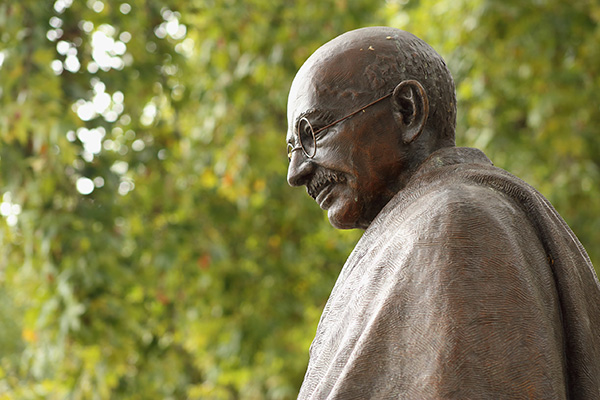
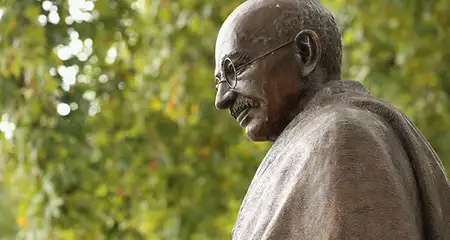
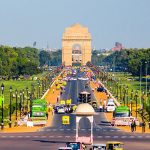 How to Reach Delhi by Flight, Train, Car or Bus
How to Reach Delhi by Flight, Train, Car or Bus  How to Reach Ahemdabad by Flight, Train, Car or Bus
How to Reach Ahemdabad by Flight, Train, Car or Bus  How to Reach Mumbai by Flight, Train, Car or Bus
How to Reach Mumbai by Flight, Train, Car or Bus  How to Reach Pune by Flight, Train, Car or Bus
How to Reach Pune by Flight, Train, Car or Bus 



